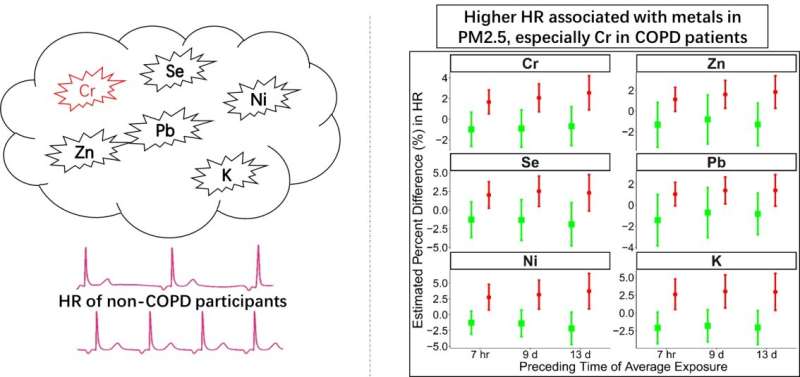
Epidemiological and toxicological studies indicate that the adverse outcomes of PM2.5 exposure associated closely with the chemical composition in PM2.5. Metals in PM2.5 are highly concerned for their induced disruption of iron homeostasis in the lung and following oxidative stress, which is one of the key mechanisms underlying the cardiovascular autonomic dysfunction of PM2.5 exposure. However, there is no clear evidence on whether COPD patients are more susceptible to cardiovascular autonomic dysfunction associated with exposure to metals in ambient PM2.5 than individuals without COPD. Based on a panel study, the researchers directly compared metal-associated cardiovascular autonomic dysfunction between COPD patients and healthy controls.
“We observed higher levels of heart rate (HR) associated with exposure to PM2.5 and the metal elements therein. Associations between HR and metals exposure in COPD patients were stronger than those in healthy controls. Exposure to Cr had robust associations with HR, comparing to other metals.” said Dr. Ke Gao, the first author for this work.
This study has many advantages. “It is a panel study design with repeated measurements of HR and exposure to metals in PM2.5. All of the recruited participants acted as their own controls, thereby lessening deviation linked to intra-individual differences. In addition, we recruited both individuals with COPD and healthy controls, allowing them to make direct comparisons of different responses from the COPD and healthy groups and to investigate the susceptibility of individuals with COPD to air pollution-linked responses.” said Dr. Xi Chen, the co-first author for this work.
“Although our results require further validation, they shed light on the disease burden of COPD associated with exposure to metals in airborne PM2.5 in China.” Said Prof. Tong Zhu, the corresponding author of the paper.
Source: Read Full Article
